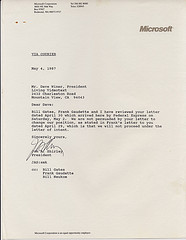 As I pack up my Berkeley house, my posessions are going one of three ways:
As I pack up my Berkeley house, my posessions are going one of three ways: 
 1. Moved to the NYC apartment.
1. Moved to the NYC apartment. 
 2. Moved to storage in Calif.
2. Moved to storage in Calif. 
 3. Sold or given away.
3. Sold or given away. 
 The vast majority of the stuff is in category 3.
The vast majority of the stuff is in category 3. 
 Most of the stuff in category 3 was stuff that went into storage after my last move, from Woodside to Cambridge in 2003. This was the stuff I thought was indispensible, yet it all stayed in boxes in my Berkeley garage until this move.
Most of the stuff in category 3 was stuff that went into storage after my last move, from Woodside to Cambridge in 2003. This was the stuff I thought was indispensible, yet it all stayed in boxes in my Berkeley garage until this move. 
 I'm taking Bruce Sterling's excellent advice, which I heard in a speech he gave at Reboot in Copenhagen last summer. I'm taking photographs of things I can't part with but haven't looked at in 20 years. And scanning a lot of documents and publishing the interesting stuff that I can publish without hurting anyone who's alive (and most of the people are alive). I haven't found a way to scan disks in formats that I don't have hardware to read, so that stuff is going into storage. That, and stuff my grandparents left me and quilts my mother made for me. Stuff like that, that should be passed down through generations, if we get that far.
I'm taking Bruce Sterling's excellent advice, which I heard in a speech he gave at Reboot in Copenhagen last summer. I'm taking photographs of things I can't part with but haven't looked at in 20 years. And scanning a lot of documents and publishing the interesting stuff that I can publish without hurting anyone who's alive (and most of the people are alive). I haven't found a way to scan disks in formats that I don't have hardware to read, so that stuff is going into storage. That, and stuff my grandparents left me and quilts my mother made for me. Stuff like that, that should be passed down through generations, if we get that far.  ">
"> 
 One of the letters I came across is relevant to the discussion about developers and Apple and Twitter, so I decided to put it up on Flickr and write it up here.
One of the letters I came across is relevant to the discussion about developers and Apple and Twitter, so I decided to put it up on Flickr and write it up here. 



 In 1987, my company, Living Videotext, had a hit product -- MORE. It was one of very few products selling on the Mac platform, having shipped in the prior year. It led a new category we called Desktop Presentations. The other product in the category was PowerPoint, produced by a company named Forethought.
In 1987, my company, Living Videotext, had a hit product -- MORE. It was one of very few products selling on the Mac platform, having shipped in the prior year. It led a new category we called Desktop Presentations. The other product in the category was PowerPoint, produced by a company named Forethought. 
 I had a meeting with Bill Gates at Esther Dyson's conference in 1987, and he popped the question every developer wants to hear -- Can we buy you? I said of course. So we started negotiation, agreed on a price and due diligence began. Then I got a letter from Frank Gaudette, the CFO of the company, and a phone call from Gates, saying they decided not to do the deal. They were buying our competitor, PowerPoint.
I had a meeting with Bill Gates at Esther Dyson's conference in 1987, and he popped the question every developer wants to hear -- Can we buy you? I said of course. So we started negotiation, agreed on a price and due diligence began. Then I got a letter from Frank Gaudette, the CFO of the company, and a phone call from Gates, saying they decided not to do the deal. They were buying our competitor, PowerPoint. 
 I totally wanted the deal. In 1987 Microsoft was freshly IPO'd. The deal was for stock, and its value had doubled while they deliberated. So I sent a letter basically begging them to do the deal, but I got back the rejection above. PowerPoint became a household name, and MORE did well, but I probably would have had more fun at Microsoft, and certainly would have made more money.
I totally wanted the deal. In 1987 Microsoft was freshly IPO'd. The deal was for stock, and its value had doubled while they deliberated. So I sent a letter basically begging them to do the deal, but I got back the rejection above. PowerPoint became a household name, and MORE did well, but I probably would have had more fun at Microsoft, and certainly would have made more money.  ">
"> 